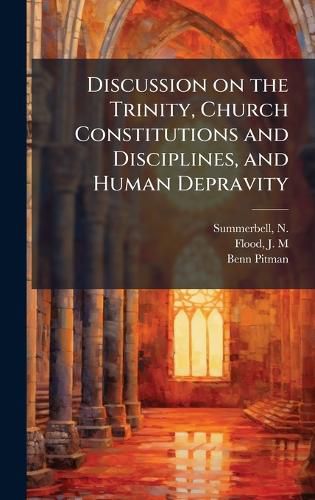Readings Newsletter
Become a Readings Member to make your shopping experience even easier.
Sign in or sign up for free!
You’re not far away from qualifying for FREE standard shipping within Australia
You’ve qualified for FREE standard shipping within Australia
The cart is loading…






This volume presents a detailed 19th-century discussion of core theological concepts, including the Trinity, church constitutions and disciplines, and the doctrine of human depravity. Featuring contributions from Nicholas Summerbell, J.M. Flood, and Pitman Benn, the book provides insights into the theological debates and perspectives of the time.
"Discussion on the Trinity, Church Constitutions and Disciplines, and Human Depravity" offers a valuable resource for understanding historical Christian thought and the development of doctrinal interpretations. It sheds light on the challenges and complexities faced by theologians as they grappled with fundamental questions of faith and practice. This work is a significant contribution to the study of Christian theology and church history.
This work has been selected by scholars as being culturally important, and is part of the knowledge base of civilization as we know it. This work was reproduced from the original artifact, and remains as true to the original work as possible. Therefore, you will see the original copyright references, library stamps (as most of these works have been housed in our most important libraries around the world), and other notations in the work.
This work is in the public domain in the United States of America, and possibly other nations. Within the United States, you may freely copy and distribute this work, as no entity (individual or corporate) has a copyright on the body of the work.
As a reproduction of a historical artifact, this work may contain missing or blurred pages, poor pictures, errant marks, etc. Scholars believe, and we concur, that this work is important enough to be preserved, reproduced, and made generally available to the public. We appreciate your support of the preservation process, and thank you for being an important part of keeping this knowledge alive and relevant.
$9.00 standard shipping within Australia
FREE standard shipping within Australia for orders over $100.00
Express & International shipping calculated at checkout
Stock availability can be subject to change without notice. We recommend calling the shop or contacting our online team to check availability of low stock items. Please see our Shopping Online page for more details.
This volume presents a detailed 19th-century discussion of core theological concepts, including the Trinity, church constitutions and disciplines, and the doctrine of human depravity. Featuring contributions from Nicholas Summerbell, J.M. Flood, and Pitman Benn, the book provides insights into the theological debates and perspectives of the time.
"Discussion on the Trinity, Church Constitutions and Disciplines, and Human Depravity" offers a valuable resource for understanding historical Christian thought and the development of doctrinal interpretations. It sheds light on the challenges and complexities faced by theologians as they grappled with fundamental questions of faith and practice. This work is a significant contribution to the study of Christian theology and church history.
This work has been selected by scholars as being culturally important, and is part of the knowledge base of civilization as we know it. This work was reproduced from the original artifact, and remains as true to the original work as possible. Therefore, you will see the original copyright references, library stamps (as most of these works have been housed in our most important libraries around the world), and other notations in the work.
This work is in the public domain in the United States of America, and possibly other nations. Within the United States, you may freely copy and distribute this work, as no entity (individual or corporate) has a copyright on the body of the work.
As a reproduction of a historical artifact, this work may contain missing or blurred pages, poor pictures, errant marks, etc. Scholars believe, and we concur, that this work is important enough to be preserved, reproduced, and made generally available to the public. We appreciate your support of the preservation process, and thank you for being an important part of keeping this knowledge alive and relevant.